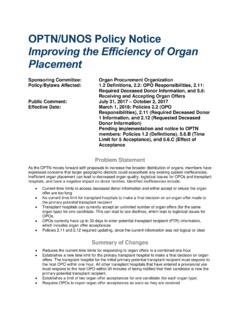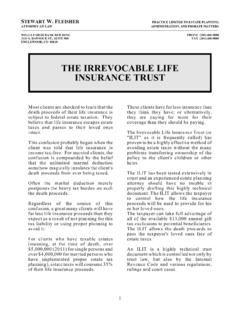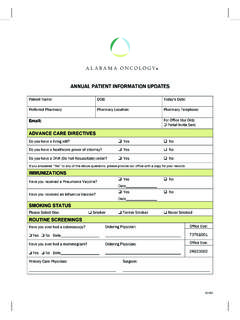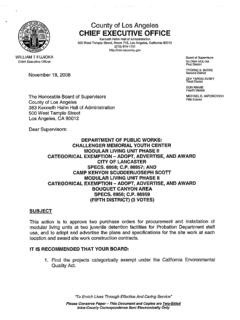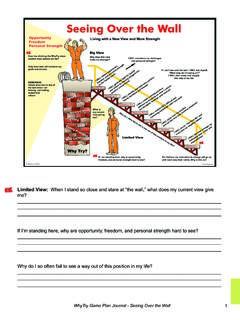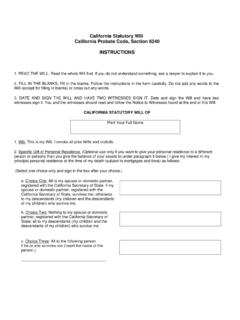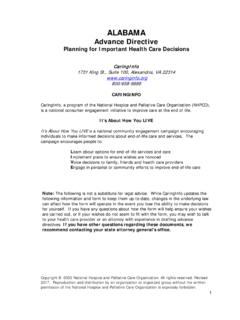Transcription of Guidance on the Benefits of Pancreas After Kidney (PAK ...
1 Briefing Paper Guidance on the Benefits of Pancreas After Kidney (PAK) transplantation OPTN/UNOS Pancreas transplantation Committee Prepared by: Abigail C. Fox, MPA UNOS Policy Department Michael Curry, MS UNOS Research Department Contents Executive Summary 1 What problem will this resource address? 2 Why should you support this resource? 2 How was this resource developed? 2 How well does this resource address the problem statement? 3 Was this proposal changed in response to public comment? 5 Which populations are impacted by this resource? 5 How does this resource impact the OPTN Strategic Plan? 6 How will the OPTN implement this resource?
2 6 How will members implement this resource? 6 Transplant Hospitals 6 Will this resource require members to submit additional data? 6 How will members be evaluated for compliance with this resource? 6 How will the sponsoring Committee evaluate whether this resource was successful post implementation? 6 Guidance Document 8 OPTN/UNOS Briefing Paper Page 1 Guidance on the Benefits of Pancreas After Kidney (PAK) transplantation Affected Policies: N/A Sponsoring Committee: Pancreas transplantation Public Comment Period: July 31, 2017 October 2, 2017 Board of Directors Date: December 4-5, 2017 Executive Summary There has been a substantial decline in Pancreas After Kidney (PAK) transplants for more than a decade.
3 PAK transplants have dropped steadily each year, with a 55% decrease from 2004 to 2011, even while 2-year Pancreas graft survival increased for PAKs from 69% to 81% for the same time PAK transplantation has historically been associated with inferior Pancreas allograft survival compared with simultaneous Pancreas and Kidney (SPK) transplantation . The OPTN/UNOS Pancreas transplantation Committee (the Committee) sought to compare PAK transplants with SPK candidates and Kidney alone recipients waiting for a Pancreas to examine what characteristics resulted in improved outcomes for PAK recipients and to address an influential previous study that demonstrated poor outcomes for PAK recipients.
4 UNOS research analysis showed that PAK transplant recipients have an increased survival advantage compared to SPK waiting list candidates who receive neither a Pancreas nor a Kidney . Moreover, compared to uremic diabetic waitlist candidates, SPK and PAK recipients showed similar patient survival Benefits . Finally, the analysis showed that both living and deceased donor Kidney recipients who subsequently receive a Pancreas transplant have better Kidney graft survival than those recipients who just received a Kidney alone. While the analysis does not include recipients that had a Kidney graft loss before the Pancreas transplant, which can bias the results to those healthy enough to get a PAK that are included in the PAK group, the results still indicate that PAK transplants are appropriate for certain diabetic uremic candidates, especially those with long SPK waiting list times.
5 The Committee seeks to provide Guidance to the community on the Benefits of PAK transplants for these candidates. 1 Gruessner, , and Gruessner. "Declining Numbers of Pancreas Transplantations but Significant Improvements in Outcome." transplantation Proceedings 46, no. 6 (August 2014): 1936-937. OPTN/UNOS Briefing Paper Page 2 What problem will this resource address? There has been a substantial decline in PAK transplants for more than a decade. PAK transplants have dropped steadily each year, with a 55% decrease from 2004 to 2011, even while 2-year Pancreas graft survival increased for PAKs from 69% to 81% for the same time PAK transplantation has historically been associated with inferior Pancreas allograft survival compared with SPK For Pancreas graft survival, the 1-year outcomes for SPK transplant ( ) compared to PAK transplant ( ) are similar, but at 5 years, the divide is greater for PAK ( ) compared to SPK outcomes ( ).
6 4 There are single center studies that show better outcomes for PAK recipients,5 and national data that similarly indicates long term Benefits to PAK The study described in this Guidance document sought to reproduce a 2003 study that found poor outcomes for PAK recipients, but with an added waiting list comparison group (PAK transplanted group being compared to waitlisted SPK candidates), Kidney and Pancreas graft survival, and an extended survival analysis to 10 years. The UNOS research analysis indicates that PAK transplants are underutilized for diabetic uremic candidates waiting for both a Kidney and a Pancreas , particularly those experiencing longer waiting times.
7 Why should you support this resource? The analysis showed that a PAK transplant offers a survival advantage compared to those who receive neither a Kidney nor a Pancreas transplant. This comparison has not previously been made, and it highlights similarities in survival outcomes to SPK recipients and the overall Benefits of uremic diabetic recipients receiving both a Pancreas and Kidney transplant either sequentially or simultaneously. Furthermore, the comparison of Kidney graft survival by transplant type suggests that receiving a Pancreas transplant may have a protective effect on the Kidney graft. PAKs represent a significant portion of the decline of Pancreas transplantation over the last Diabetic uremic candidates may be appropriate candidates for a living donor Kidney followed by a Pancreas transplant, but choose to only receive the living donor Kidney because of perceptions about whether PAK transplants are beneficial.
8 SPK candidates are significantly more likely to die After one year on the waiting list, but SPK candidates or their doctors may not consider a PAK as a viable option due to concerns about PAK outcomes. Increasing PAK transplantation for appropriate candidates can slow the decline in Pancreas transplantation , increase the number of transplants overall, and, when done following a living donor Kidney transplant, result in a deceased donor Kidney being released to the deceased donor pool for Kidney transplant This Guidance document provides information to transplant physicians and their patients about the options for using PAK and when it may be an appropriate choice for diabetic uremic candidates.
9 By performing analyses that were previously not explored, this resource highlights how PAK transplants are underutilized. How was this resource developed? The Committee reviewed this new initiative addressing PAK decline in October 2015. The Committee viewed the substantial decline in PAK transplants over the last decade as a significant issue and supported developing a project to address it. In January 2016, the Committee decided to review the 2 Gruessner, 1936-937. 3 Curry, Michael. UNOS Research, 2016 OPTN Data. 4 Ibid. 5 Fridell, Jonathan A., Richard S.
10 Mangus, Edward F. Hollinger, Tim E. Taber, Michelle L. Goble, Elaine Mohler, Martin L. Milgrom, and John A. Powelson. "The case for Pancreas After Kidney transplantation ." Clinical transplantation 23, no. 4 (May 13, 2009): 447-53. 6 Gruessner, R. , Sutherland, D. and Gruessner, A. Mortality Assessment for Pancreas Transplants. American Journal of transplantation , 4 (2004): 2018 2026. 7 Stratta, Robert J., Jonathan A. Fridell, Angelika C. Gruessner, Jon S. Odorico, and Rainer Gruessner. Pancreas transplantation : A Decade of Decline. Current Opinion in Organ transplantation 21, no. 4 (August 2016): 386-92.




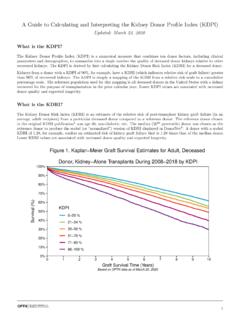

![OPTN Policies effective January 11 2022 [Reinstate 1.4.F]](/cache/preview/0/9/1/f/9/2/b/4/thumb-091f92b4fa746b230278ada3b513845c.jpg)

